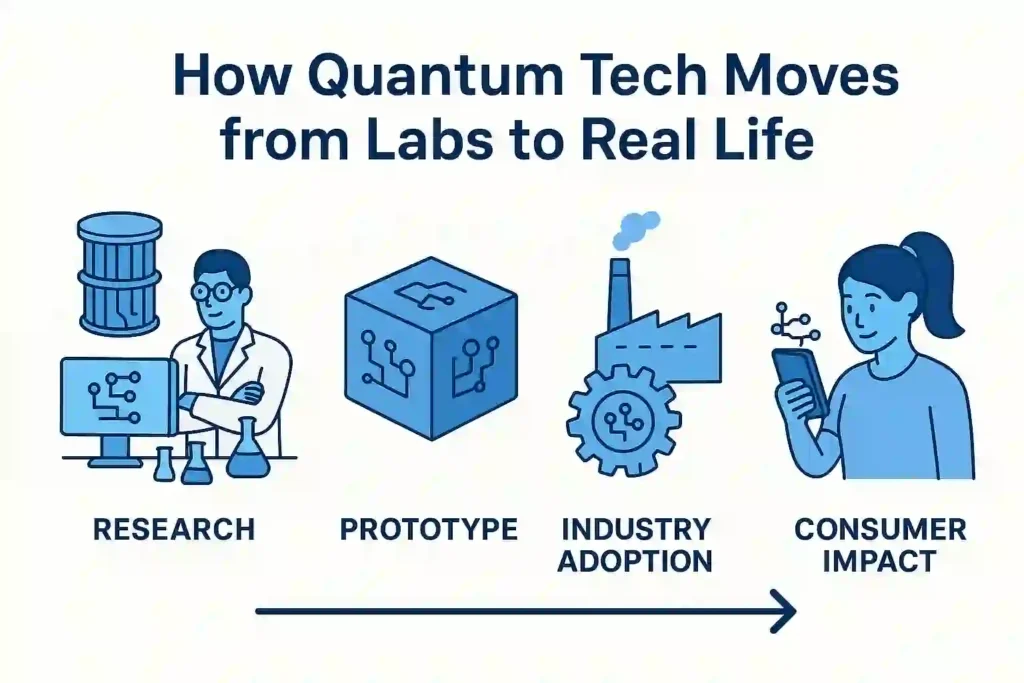Introduction
For decades, quantum technology was considered something out of science fiction—a field reserved for researchers, scientists, and theoretical physicists. Fast forward to 2025, and quantum tech is no longer confined to laboratories. It’s beginning to reshape industries, solve real-world challenges, and unlock possibilities that were once unimaginable.

From quantum computers that can crack problems classical computers struggle with, to quantum sensors that detect diseases earlier than ever, the world is starting to see how this cutting-edge technology is moving from the lab into our daily lives.
In this blog, we’ll break down what quantum technology is, the breakthroughs fueling its rise, industries adopting it, real-world examples, challenges, and what the future may hold.
What Is Quantum Technology?
Quantum technology leverages the principles of quantum mechanics, the branch of physics that studies how particles behave at the smallest scales. Unlike classical computing, which relies on bits (0s and 1s), quantum systems use qubits—tiny units of information that can exist in multiple states at once.
This property, known as superposition, along with entanglement and tunneling, gives quantum technology incredible potential to perform calculations and solve problems far beyond the reach of even the most advanced classical supercomputers.
If you want a quick primer, check out IBM’s introduction to quantum computing.
Why Is Quantum Tech Important?
The potential of quantum technology isn’t just about speed it’s about capability. Problems in drug discovery, logistics, climate modeling, cybersecurity, and finance are so complex that today’s computers can’t solve them efficiently. Quantum systems are designed to tackle these “impossible” challenges.
For example:
Drug discovery could take years with classical methods, but quantum simulations may test millions of molecules in hours.
Supply chain optimization, especially in a post-pandemic world, could benefit from quantum-powered logistics.
Cybersecurity may be redefined, as quantum computers could crack existing encryption but also enable quantum-safe cryptography.
Key Breakthroughs Bringing Quantum to Reality
1. Quantum Computing Progress
Companies like Google, IBM, Microsoft, and Rigetti have developed quantum processors with increasing numbers of qubits. In 2019, Google claimed “quantum supremacy” by solving a problem no classical computer could handle in a reasonable time. Since then, progress has accelerated.
2. Quantum Sensors
Quantum sensors are already being tested in medicine and navigation. They measure changes at extremely small scales, enabling breakthroughs in early disease detection, earthquake prediction, and precise GPS-independent navigation.
3. Quantum Communication
Quantum communication uses entanglement to send information in ways that are virtually impossible to hack. China has already demonstrated satellite-based quantum communication, and projects in Europe and the U.S. are racing ahead too.
Real-World Applications of Quantum Technology
Healthcare and Drug Discovery
Quantum simulations can analyze molecular interactions at levels classical systems can’t match. Pharmaceutical companies like Roche and Pfizer are collaborating with quantum firms to accelerate drug discovery and vaccine research.
Finance and Risk Analysis
Banks and financial institutions are exploring quantum algorithms to optimize portfolios, predict risks, and detect fraud. JP Morgan Chase is already experimenting with quantum computing for real-time financial strategies.
Artificial Intelligence (AI)
Quantum-enhanced machine learning can train AI models faster and process far more complex datasets, paving the way for smarter autonomous systems and predictive analytics.
Cybersecurity
While quantum tech poses a risk to today’s encryption, it’s also leading to the development of quantum-safe encryption methods. Governments and companies are already preparing for a post-quantum cryptography future.
Climate and Energy
Quantum simulations could dramatically improve climate modeling and energy grid management. Startups are also looking at how quantum systems might optimize renewable energy storage and usage.
Challenges to Overcome
Error Rates – Quantum computers are still prone to “noise” that can disrupt calculations.
Scalability – Building stable systems with millions of qubits is an engineering challenge.
Cost – Quantum hardware requires extremely controlled environments, like near-absolute zero cooling.
Accessibility – For now, access to quantum systems is mostly cloud-based, limiting widespread use.
Still, progress is steady, and tech leaders believe practical large-scale applications are less than a decade away.
From Labs to Real-World Impact: Current Examples
Volkswagen used quantum computing for traffic flow optimization.
BMW is applying quantum tech to materials research for electric vehicle batteries.
Fujitsu and Cambridge Quantum are developing quantum-enhanced cybersecurity solutions.
NASA is researching quantum systems for space mission planning.
More collaborations are announced almost every month, highlighting how quickly lab experiments are becoming real-world tools.
The Future of Quantum Tech
By 2030, experts predict that quantum technology could be as transformative as the internet. Its applications may expand to:
Personalized medicine tailored to individual DNA.
Quantum internet providing ultra-secure global communication.
Smart cities with quantum-optimized infrastructure.
Advanced AI capable of solving complex societal challenges.
For more insights, see McKinsey’s Quantum Tech Outlook.
FAQs
Q1: When will quantum computing become mainstream?
Most experts estimate within the next 5–10 years for commercial applications, though niche uses are already emerging.
Q2: Is quantum technology safe?
Quantum communication (via QKD) is considered one of the most secure forms of communication, but widespread adoption requires more infrastructure.
Q3: Will quantum computers replace classical computers?
Not entirely. Quantum systems excel at specific complex problems but will work alongside classical systems.
Q4: How will quantum tech impact everyday people?
From faster drug discovery to secure online banking and better medical imaging, quantum’s benefits will trickle down into everyday life.
Q5: What industries will benefit most?
Healthcare, finance, cybersecurity, materials science, and logistics are at the front line.
Final Thoughts
Quantum technology is no longer just a theoretical pursuit—it’s becoming a practical tool with real-world impact. From healthcare to finance, cybersecurity to climate science, its potential is reshaping industries and daily life.
2025 may be remembered as the year when quantum innovation started to shift from lab experiments to global applications. While challenges remain, one thing is clear: quantum tech is here to stay, and its impact will only grow.
